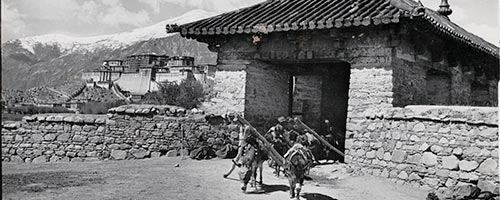Browse
Photographers
Bell, Chapman, Richardson…
Collections
Pitt Rivers Museum, British Museum, albums…
Places
Tibet, Central Tibet, Lhasa…
Dates
Mission Diaries, events, calendars…
People
British, Tibetan, lists…
CREATE ALBUM
Select and compare photographs, add captions, create your own 'Tibet Album' and send it to a friend.
FEEDBACK
Can you identify people and places in these photographs? Use feedback button to send us your comments.
ZOOM
Examine photographs in fine detail with our powerful zoom function.
SEARCH
Find photographs by subject ( music, food, buildings…)
For a more powerful search function use "Advanced Search"
ALBUMS
View historic albums made by Richardson, Staunton or Nepean, Search page by page and explore other visual narratives.
MAPS
View interactive maps of:
Tibet (location)
Central Tibet (Gyantse, Tsurphu…)
Lhasa (Potala, Jokhang…)
DIARIES AND DOCUMENTS
Detailed chronologies based on the personal accounts of Bell, Chapman, Richardson
See photographs by date according to the Western calendar
FIND PEOPLE
Search for British photographers (Bell, Staunton, Nepean…)
Search for portraits of named people (Dalai Lama, Tsarong…)
Read biographies and see photographs.
The Tibet Album presents more than 6000 photographs spanning 30 years of Tibet's history. These extraordinary photographs are a unique record of people long gone and places changed beyond all recognition. They also document the ways that British visitors encountered Tibet and Tibetans.
Featuring photographs taken by Charles Bell, Arthur Hopkinson, Evan Nepean, Hugh Richardson, Frederick Spencer Chapman, Harry Staunton and the previously unidentified photographs of Rabden Lepcha.
Our specially designed functions (maps, zoom, album…) enable you to browse this site in many different ways. Photographs appear in a variety of formats and can be linked to the visual narratives they were originally used for.
Read in Tibetan
Read more about our work…
This site provides access to the photograph collections of two important British museums - the Pitt Rivers Museum (Oxford) and the British Museum (London).
Read more about the Pitt Rivers and the British Museum
The Tibet Album is funded by the Arts and Humanities Research Council.
